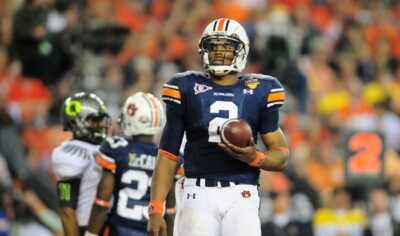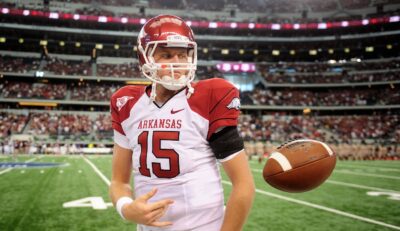Saturday Night Live ran a bit in the 1970s where a “land shark” politely talked its way into a home before devouring its victim.
The modern-day version of the land shark — the one reanimated in the form of the Ole Miss defense — doesn’t ask permission to enter. It simply kicks down the door and comes after you.
In either scenario, by the time you see the fin it’s too late.
The Landshark tradition at Ole Miss dates all the way back to aught eight. That’s 2008, to be exact, and since then the “Fins Up” battle cry and accompanying dorsal fin hand gesture have become an institution at Oxford, Mississippi’s finest institution.
The Landshark can trace its origin to Houston Nutt’s first year coaching Ole Miss. The Rebels were coming off a stretch of futility that saw them go 14-32 and bowl-less during a four-year stint under Ed Orgeron and the final season under David Cutcliffe.
Things turned around under Nutt. Led by standouts Peria Jerry, Greg Hardy and Jerrell Powe, the Rebels defense ascended to No. 4 in the nation. Ole Miss capped its 9-4 season with a 47-34 victory over Texas Tech in the 2009 Cotton Bowl.
At the heart of the defense was senior linebacker Tony Fein. In two seasons in Oxford, Fein wrapped up 136 tackles, including eight of them for a loss. He finished third on the team in tackles that season, but his true worth to the Ole Miss defense was measured in his heart, work ethic and a quirky celebration that became all the rage.
Fein served a one-year tour in Iraq as a member of the U.S. Army before embarking on a college football career. In 2008, the Military Order of the Purple Heart awarded Fein — a two-year letterman at Scottsdale Community College prior to Ole Miss — its Pat Tillman Award.
After each big play, Fein would fashion his hand into a shark fin on his forehead. The “Fins Up” mantra followed shortly and Rebel Nation had, not only a revitalized football program, but a brand new fledgling tradition, as well.
Tragedy struck a year later, however, when the 27-year-old Fein collapsed near his Port Orchard, Wash., hometown and passed away from an accidental Alprazolam overdose.
After Fein’s passing, the Landshark became a rally symbol, a way to honor Fein, and a physical embodiment of the team’s resolve.
The craze swept campus and spilled onto the streets of Oxford. All Rebels varsity squads eventually adopted the Landshark as their own.
Hugh Freeze replaced Nutt in 2012 and the Rebels defense only grew stronger. With every sack, interception or pick-six, so, too, did the Landshark. Three years into Freeze’s tenure and Ole Miss had the No. 1 scoring defense in the nation yielding 16.0 points per game.
Safe to say, the Landshark was here to stay. So much so, that in October 2014, SEC officials asked Ole Miss to cease performing the gesture on the field. The school fought the ruling and won.
Social media has only fueled the craze.
The Landshark tradition has a life of its own on Twitter alone, where it shares a #Landshark hashtag with Jimmy Buffett’s … let’s call it beer.
You’ll find #Landshark affixed to official Rebels Football tweets. It’s attached to photos of families and babies in Ole Miss pajamas. Mothers tweet out #Landshark after their sons display the gesture upon scoring a goal in youth soccer.
You’ll even find creative tweeters awkwardly wedding the #Landshark hashtag with the likes of Discovery Channel’s Shark Week and Katy Perry’s Left Shark.
Olemiss fans RT to see @katyperry throw the #Landshark during super bowl halftime!!! #olemiss #finsup
— Rebel nation (@Olemissnation) January 30, 2015
Plus, it is Twitter, so naturally, #Landshark has its fair share of detractors and smack-talkers.
The Landshark has arrived. We’re witnessing the birth of a new tradition. One that appears ready to rank up there among such cherished Ole Miss rituals as tailgating on The Grove, The Walk of Champions, and Hotty Toddy.
Chris Wuensch is a contributing writer for Saturday Down South. He covers South Carolina and Tennessee.







